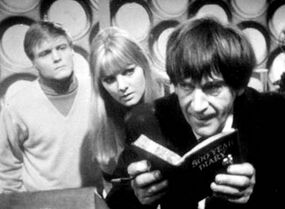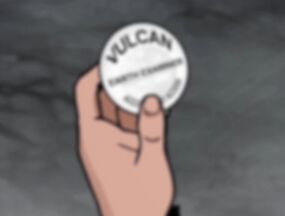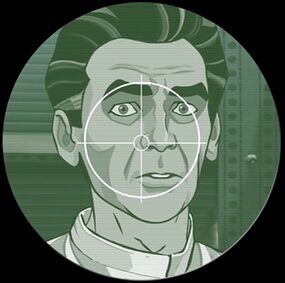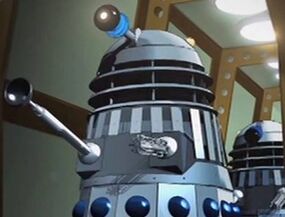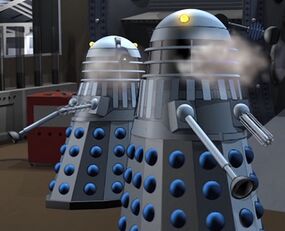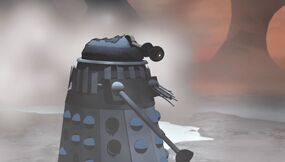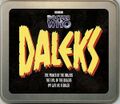The Power of the Daleks (TV story): Difference between revisions
m (Bot: Cosmetic changes) |
m (Bot: Replacing category Stories that crossover with non-DWU series with Crossovers with non-DWU series) |
||
| Line 567: | Line 567: | ||
[[Category:New Beginnings television stories]] | [[Category:New Beginnings television stories]] | ||
[[Category:An Introduction To The Second Doctor television stories]] | [[Category:An Introduction To The Second Doctor television stories]] | ||
[[Category: | [[Category:Crossovers with non-DWU series]] | ||
[[Category:Completely missing serials]] | [[Category:Completely missing serials]] | ||
Latest revision as of 09:23, 3 December 2024
The Power of the Daleks was the third serial of season 4 of Doctor Who.
It was the first post-regeneration story in the show’s history, and marked the first full appearance of Patrick Troughton as the Second Doctor after making a brief non-speaking cameo at the end of the previous story.
The story also marked the first time a different actor would go on to portray the Doctor on screen and not have the original incarnation be the incumbent Doctor of the series, although William Hartnell would appear as the First Doctor one last time before his death in The Three Doctors along with Troughton.
While all six episodes are currently missing from the BBC archives, an animated reconstruction based on the surviving audio and video was released on the BBC Store on the 50th anniversary of the serial's original airing, 5 November 2016,[1] and a DVD was released on 21 November, 2016. Furthermore, a version in colour was released on BBC Store on 31 December followed by a Special Edition blu-ray, containing both the black and white and colour versions, from 6 February 2017.[2] Additionally, an updated Special Edition featuring "fresh animation in high definition" and "authentic black and white visuals" was released on 27 July 2020.
Synopsis[[edit] | [edit source]]
Following the Doctor's renewal into a new, younger body, the TARDIS lands at an Earth colony on the planet Vulcan in the far future. Mistaken for an official Earth Examiner, the Doctor discovers that a scientist called Lesterson is attempting to reactivate three inanimate Daleks found in a crashed space rocket. The colonists refuse to heed the Doctor's dire warnings that the Daleks are dangerous. Once reactivated, the Daleks begin performing duties around the colony and so a rebel group plot to use these new "servants" to help them gain power. But in fact, the Daleks have sinister plans of their own...
Plot[[edit] | [edit source]]
Episode one[[edit] | [edit source]]
Ben and Polly are bewildered after discovering that the the Doctor has transformed into a completely different, younger man. Ben asks how this is possible, and Polly remarks that the Doctor said his body was "wearing a bit thin" and this is what he probably meant. The Doctor recovers and groans in pain. His head is filled with the sound of drumming. He finally comes to and chuckles to himself that "it's over". The ring that the Doctor used to wear falls off his finger because it doesn't fit anymore. The new Doctor rummages through his old things and finds a mirror which he thrusts into Ben's hand. The mirror briefly reflects the face of the First Doctor before changing back into that of the Second Doctor. He also finds a dagger which "the Doctor" got from Saladin. Ben asks why he is referring to himself in the third person and begins to suspect he isn't the Doctor. The Doctor finds a piece of metal in his jacket and murmurs "extermination" to himself. He also finds a recorder. Upon further searching, he finds a Five Hundred Year Diary. On finding this he suggests they go for a walk. He opens the TARDIS door. Ben is concerned that the Doctor hasn't taken any readings, but the Doctor reveals that he has but no one noticed.
The Doctor exits the TARDIS while reading the diary at the same time. The TARDIS has landed on a desolate planet filled with rocky formations and mercury pools, which he manages to dodge whilst not looking up from his diary. He reaches a large rock and, in order to test out his new body, leapfrogs over it. Then he finds a man shouting for assistance. As the Doctor approaches, the man is shot and killed by an unseen assassin. Examining the body, the Doctor finds a badge reading VULCAN / EARTH EXAMINER / ACCORD EVERY ACCESS and puts on his predecessor's wire-rimmed reading glasses to examine it. Everything becomes blurry and the Doctor soon realises this is caused by the glasses, which he doesn't need any more. He removes the glasses and carefully puts them away, before returning his attention to the badge; the man is the Examiner from Earth. Meanwhile, the Doctor is almost the assassin's next target; he is knocked unconscious, though he pulls a button off the attacker's clothes as he is taken down.
Ben and Polly emerge from the TARDIS, but get too close to the mercury pools and collapse from the fumes.
The three travellers are rescued by Quinn, Deputy Governor, and Bragen, Head of Security. They take the Doctor for the Examiner, something the Doctor elects to go along with. They explain that they are on the planet Vulcan and allude to the fact the Examiner must be here to examine the "space capsule".
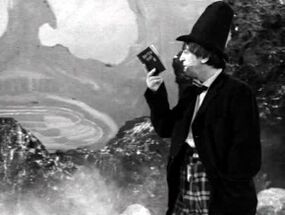
At the human colony, Lesterson, a scientist, is informed by his assistant Janley that the Examiner has arrived. Lesterson has no knowledge of this. Janley asks if she can still have her meeting here tonight. Lesterson agrees, warning her against underground movements, but he is distracted by experiments on his capsule which is made of a metal that is entirely non-corrosive. It has been in the mercury swamps for 200 years.
When in the colony, the Doctor admits nothing, playing the fool and (much to Ben's annoyance) remains very inactive, hoping to expose the murderer of the real Examiner. Governor Hensell introduces himself and gives him free run of the compound. The Doctor asks about the capsule, and Hensell explains it was fished out of a mercury pool from where it had lain dormant for hundreds of years. The Doctor states that he will look at it later and dismisses his visitors. The Doctor confides to Ben and Polly that he thinks this story is not true.
In the corridor outside, Janley comes across Quinn, with whom she seems very close. She touches his sleeve and mentions that he is missing a button.
With Hensell, Quinn and Bragen, the Doctor and his two friends are brought to the laboratory where Lesterson and Janley are studying the capsule. Whilst looking around the lab, the Doctor finds a piece of metal exactly like the one in his jacket. The scientists ask him for permission to open the capsule — which he grants them. They open the hatch with a laser to reveal an empty entryway. The Doctor finds a thin opening in the capsule but doesn't mention it to anyone. He orders they go no further tonight, to Hensell's annoyance. Hensell states that he must regret sending for the Examiner now. Lesterson said he didn't send for him.
The Doctor returns later that night and secretly re-enters the capsule, using the piece of metal from the TARDIS as well as the one from the lab as a key. Ben and Polly follow him. Finding his way into an inner chamber, the Doctor discovers two dormant Daleks and some space where a missing third one must have been. Polly screams as a mutant creature scurries across the floor.
Episode two[[edit] | [edit source]]
Ben is dispatched to fetch a torch to track down the mysterious creature. As he does, he is observed by Resno, one of Lesterson's research assistants. The Doctor suspects Lesterson has already been inside and taken the missing Dalek. Polly thinks the creatures must be dead, but the Doctor tells her that power is all they need to be revived, and one Dalek could wipe out the colony.
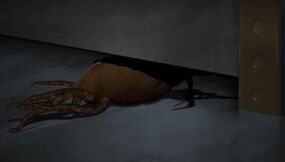
Quinn cannot find the Examiner in his quarters, but Bragen finds Quinn and questions him. Quinn is dismissive and distrusting. The two squabble. Quinn knocks Bragen over during his attempt to block Quinn's departure. Bragen orders a search for the Examiner.
Lesterson discovers the Doctor and friends in his laboratory and angrily orders them out. The Doctor points out to Ben and Polly that not once did Lesterson stop and marvel at the Daleks on his entrance and says that this proves that he has seen them before. The Doctor confronts him about the missing Dalek as Bragen arrives. Lesterson vociferously denies having the third Dalek. The Doctor urges the Daleks be destroyed and leaves with Bragen to get permission from the governor. Lesterson orders Resno to find Janley and retrieves the missing Dalek from a secret compartment, excited at the prospect of bringing the machine back to life before the Doctor can stop the experiment.
Bragen tells the Doctor about the underground rebel movement. He advises the Doctor to investigate discreetly as Hensell is distracted by the minor acts of sabotage carried out by the underground movement. After Bragen leaves to set up a meeting with the governor, Ben continues to be sceptical about this being the Doctor. The Doctor suddenly silences them and cuts open a piece of fruit to discovers a listening device which he crushes underfoot. The Doctor and his companions try to figure out the mystery of who called for the Examiner and who might have killed him. They rule out Lesterson, who wouldn't want his experiment tampered with, and the governor, who wouldn't want someone interfering with his project. Ben implores the Doctor they return to the TARDIS and leave, but the Doctor says that he has seen the destruction the Daleks cause and it is his duty to stop them. Bragen returns to announce that the governor cannot see him until the next morning. The Doctor refuses to wait any longer and tells Ben and Polly he is going to radio Earth directly to stop the project.
Meanwhile, Lesterson, Janley and Resno continue experiments on the Dalek. There is animosity between Janley and Resno as Resno knows that Janley is part of the underground gang. He warns her that the governor knows about them, and it's a matter of time before they are crushed. The scientists manage to re-activate the Dalek's gun stalk and sucker arm as well as its eye stalk. Resno is uneasy and suspects that the Dalek is looking at them, but the others are excited and focused on their work.
The Doctor goes to the communications room but finds it smashed; the operator has been attacked and the wires snipped. Quinn steps from the shadows and tries to speak to the Doctor, but Bragen arrives and arrests Quinn on circumstantial evidence, including the button the Doctor took from his attacker, matching the button on Quinn's tunic and the fact that Quinn has pliers on him.
During the experiment, Resno is shot by the Dalek. Janley announces that he's been knocked out. As Lesterson goes to get help, Janley wraps up the body and reinvigorates the Dalek herself.
The next day, back in the Examiner's quarters, Polly doesn't believe that Quinn could be guilty despite Ben's insistence he must be. The three are escorted by Bragen to attend Quinn's inquiry.
Lesterson has removed the gunstick and Janley has instigated a hush-up job on the injury to Resno so that they can continue the experiment. Lesterson is pleased with this and runs to show the governor instantly.
Hensell cross examines Quinn with Quinn pointing out there is no hard proof against him. Lesterson excitedly interrupts the inquiry to present the re-activated Dalek to all assembled. The Dalek seems to recognise the Doctor, which dispels any further doubts Ben has regarding the Doctor's identity. Lesterson shows some of the capabilities of the machine, including its ability to do what it is asked of it. It surprises everyone when it speaks. As the Doctor fruitlessly pleads for the Dalek to be destroyed, the Dalek intones, "I am your servant!"
Episode three[[edit] | [edit source]]
The governor is persuaded that the Daleks could be of great help to the colony as well as to Earth and gives permission for Lesterson to continue his experiments. The Doctor vows under his breath that he will stop the Daleks. The Doctor tests the Dalek's servility by ordering it to immobilise itself, which it does begrudgingly. It immediately activates after the Doctor has left and announces that it obeys Lesterson. Hensell marvels at the Dalek's ability to reason. As Lesterson goes to continue with his experiments, the inquiry continues. Quinn admits it was he who sent for the Examiner, saying he did it to deal with the rebel uprising. His explanation is brushed aside by Bragen, who suggests that Quinn did it to undermine Governor Hensell's authority and is himself in league with the rebels. Hensell orders Quinn imprisoned and promotes Bragen to Deputy Governor.
In his quarters the Doctor has cobbled together a small device using a control unit he stole from Lesterson's lab and a metal bracket from the bed. The three travellers go to the laboratory. On the way they encounter Quinn being led away. Polly is upset, but the Doctor placates her by saying that if he is innocent it will be found out. He tells Ben and Polly to amuse themselves as he gatecrashes Lesterson's lab.
Lesterson marvels as the Dalek is able to answer complex scientific questions. When the Doctor enters, Lesterson is suspicious, but the Doctor is suppliant and asks to observe the experiments. Lesterson agrees. Janley receives a phone call and excuses herself, ensuring she picks up a small bundle as she leaves. As the experiments continue, the Doctor secretly attaches his device to the power generator, causing the Dalek to painfully lose control. Lesterson destroys the device and pushes the Doctor out; the Dalek watches him go as its detached gun mechanism clicks uselessly in an effort to kill the Doctor.
Janley and Bragen meet in secret; she is a rebel leader, and Bragen is using the rebels to gain power himself. Janley believes that the Dalek's gun stick, the contents of the parcel she took from the lab, could be the clinching factor in their plans to take control of the colony. She explains she has an associate called Valmar who is going to help her utilise the gun stick as a weapon. She reveals she lied when she told Lesterson Resno was ill and that he is actually dead; she dumped Resno's body in a mercury pool. She says she did this to avoid distracting Lesterson from his work, but also says it may be useful to blackmail him with later. Bragan is reluctant to go forward with his coup whilst the Doctor is still on the colony.
Ben and Polly are searching for the Doctor. Polly splits up with Ben intending to go back to their quarters. She encounters Janley who, seeing her chance to eliminate the threat the Doctor causes, directs Polly to the control room where Valmar waits for her. He grabs her and Janley drugs her. Janley gives Valmar the gun stick for him to experiment with.
Ben worries about the disappearance of Polly, but the Doctor is distracted with the Daleks and doesn't believe she is in danger. Ben drags the Doctor off to report his worries.
Meanwhile, the Dalek delights Lesterson with the breadth of its knowledge as well as its curiosity. The Dalek is keen to know what all the equipment in the laboratory does. In exchange for increased power and equipment, it promises to manufacture beneficial equipment for the colony. Lesterson is most interested in the Dalek's promise that it can create a piece of machine that would predict meteor storms with 100% accuracy. Lesterson rushes off to inform Hensell of the good news. When the Dalek is alone, it increases the flow of power from the generator and enters the capsule.
The Doctor and Ben, having spotted Lesterson leaving his lab, enter and investigate. They discover a thick cable leading from the generator into the capsule. The Dalek attempts to stop them and orders them to leave. Ben attempts to short-circuit the generator but is stopped by two reinvigorated and armed Daleks that emerge from the capsule. The Doctor and Ben run for the lab. The Daleks reveal that their plan is to harness the machinery to pulse static electricity through out the colony and make Vulcan a second Skaro.
In front of the governor, the Doctor and Lesterson argue. The Doctor, again, demands the destruction of the Daleks. Hensell overrules this and says they are to remain functioning. When alone Ben informs Bragen of Polly's disappearance. Bragen then tells the Doctor and Ben that the body of a middle-aged man has been found in the mercury swamp and suggests that the Doctor isn't the Examiner and is working with the rebels. The Doctor admits he isn't the Examiner but insists the only way Bragen can prove that to everyone else is to admit that he is the murderer of the original examiner. At checkmate, Bragen says he will not inform anyone that the Doctor is an impostor if he leaves the Daleks alone. Once the Doctor and Ben are alone, a note is slipped under the door, which says The girl is safe. She will remain so as long as you leave the Daleks alone.
Lesterson is pleased to see the Daleks have voluntarily disarmed themselves. The chief Dalek asks if they are to be afforded the materials and additional power they desired. On finding out they will, the three Daleks chant, "We will get our power," as a bemused Lesterson looks on.
Episode four[[edit] | [edit source]]
Lesterson reacts by turning down the generator and uses it to try to keep control of the Daleks. He turns it back up when the Daleks assure him of their obedience. He asks to see the blueprints of the meteor prediction machine. He is very pleased with their plans.
Bragen is settling in with his new power, with Hensell out on the perimeter of the colony for a day or two. Bragen is dismissive and hostile to Valmar whilst the latter fixes the communication system. The Doctor and Ben push their way in and show him the note telling of Polly's kidnapping. The Doctor is unnerved as a Dalek brings drinks on a tray. Bragen is unhelpful. When they leave, Bragen contacts Hensell, whom he assures that the colony is running smoothly. Hensell explains he'll be gone for a few more days.
When they leave, the Doctor speculates how long the Daleks will be able to move without static electricity. The Doctor sees a Dalek go into Bragen's office but then sees three more further down the corridor. This concerns him as originally there were only three. The Doctor and Ben decide to go see Lesterson. On the way, they walk past a seemingly innocent notice board around which he notices a number of people have gathered.
In the lab, Lesterson is disturbed by the large quantities of supplies the Daleks are requesting. He begins to suspect that the Examiner may have been right about the Daleks and wants to ask his advice. Janley blackmails Lesterson by revealing Resno's death to him to prevent his acting against the Daleks and the rebels. The Doctor and Ben arrive, inquiring about Polly, and tell Lesterson about the new Daleks. The Doctor disabuses him of the idea that the Daleks are just machines; they are brilliant engineers and given the right materials could be infinitely powerful. Lesterson is very shaken by this and collapses; Janley fetches a guard who forces them out. She accuses them of attacking Lesterson. With Lesterson unconscious Janley takes control and further supplies the power and materials the Daleks require.
The Doctor figures out that the notice board is being used to announce rebel meetings in code. He decodes that a meeting is to be held tonight. He and Ben conceal themselves in the meeting room prior to it beginning. Janley and Valmar display the Dalek to the meeting; Janley is in control but is taking orders from a man that the Doctor and Ben cannot see. Valmar has connected a controlling device to the Dalek's gun. The meeting is hostile towards Janley's plan to use the Daleks to seize power of the base. In order to prove the Daleks are fully under their control, Janley uses herself as a guinea pig. The Dalek is ordered to attack her and is unable to. When they mention they are holding Polly, Ben accidentally reveals their presence and tries to flee but is knocked out and dragged away. The Doctor is called out of the darkness by the man in charge of the meeting — Bragen, who reveals himself to be the leader of the rebels. The Doctor threatens to tell the governor of this duplicity, but Bragen counters this by reminding him about the fate of the real Examiner and that he plans to frame the Doctor for that.
Bragen has the Doctor imprisoned with Quinn. Quinn is initially hostile, since the 'Examiner' seemed so unwilling to listen to him earlier, but the Doctor tells Quinn of Bragen's crimes and explains he is not the real Examiner. He notices that the prison cell is locked through a sonic sound and empties his pockets in a search to free himself.
Lesterson awakes and sees the Daleks conspiring together. He fearfully enters the capsule and discovers a room where numerous Daleks are operating machinery. He finds a production line where they are mass-producing dozens of Daleks.
Episode five[[edit] | [edit source]]
Lesterson, shocked by what he has witnessed, runs out of the capsule, puts a cabinet over the door and deactivates the power generator. He tells Janley what he's seen inside and explains that he is going to melt the capsule; she runs off to get help for Lesterson. He tries to telephone the Doctor, only to discover he is in prison. The Daleks emerge from the capsule to Lesterson's horror. When he asks how they're moving without power, the Dalek explains they can store power. He runs off in panic. A Dalek instructs another that no more than three are to be seen together at any one time, the rest remaining in the capsule. A bound and gagged Polly is led into the lab by Janley and Kebble and is to be kept imprisoned in the capsule. The Dalek explains to Janley that they are building a static electricity converter to make them twice as powerful.
At the prison, the Doctor is trying to mimic the sound of the sonic key by running his finger over a glass of water but is failing. Lesterson breaks in to speak to the Doctor; he screams what he's discovered and is hauled away by guards.
Lesterson is brought before Bragen as a Dalek works laying cables in his office. Lesterson asks what the Daleks are doing; the Daleks say they are following Lesterson's orders for an emergency back up station. Lesterson denies ever having given this order. Janley arrives and tries to paint him as a madman. Bragen orders him restrained.
In the capsule, Valmar and Kebble are helping the Daleks with this network, as they also keep guard on the captive Polly. Kebble is initially nasty to Polly but Valmar sticks up for her. Polly tries to convince Valmar and Kebble of the Daleks' true natures, revealing to them the deception about the Examiner. Kebble is unconvinced, but Valmar is now starting to suspect that the Daleks may be as dangerous as Polly claims.
Meanwhile, Hensell returns from the perimeter and detects an attitude from Bragen's guard when asking about the Dalek cables.
The Doctor gives up on trying to escape and plays his recorder. The pitch of one of his notes opens Quinn's door. Quinn incapacitates the guard and frees the Doctor — placing the guard in the Doctor's cell.
Hensell returns to find Bragen seated at his desk. When asked where the Examiner is, Bragen explains the Doctor's duplicity and puts him in the frame for murder. Hensell is worried that Bragen might have his facts wrong, but Bragen is dismissive of the issue, his whole attitude supercilious and arrogant. When an outraged Hensell attempts to reclaim his power, Bragen refuses. Finally realising that Quinn's warnings about Bragen and the rebels were well-founded, Hensell calls for the guards, but they refuse to help. Bragen 'asks' Hensell for his cooperation in controlling the people. Despite the obvious threat on his life, Hensell refuses to be intimidated into becoming a puppet ruler, so Bragen has him killed with a blast from a Dalek.
The Doctor and Quinn have sneaked into the laboratory and overhear Janley and Valmar discuss the return of Hensell before they leave the lab accompanied by a Dalek. Polly overhears the Doctor and calls out for help. Kebble and Quinn fight and Kebble is knocked unconscious. A Dalek comes out of the capsule, and the trio run. The Doctor jams the door to the laboratory with a spanner as he leaves.
The Dalek army congregates in the capsule and formulates a plan. They are to wait until the humans begin fighting amongst themselves and then reap destruction.
The Doctor, Quinn and Polly discover Hensell dead, but they are captured by Bragen and his guards. Bragen has instigated martial law and orders the trio's return to prison.
The Dalek army seize their chance and emerge to engage in full-scale slaughter, chanting, "Daleks conquer and destroy!"
Episode six[[edit] | [edit source]]
As the guards usher the Doctor, Quinn, and Polly to prison, they are stopped by armed Daleks. The Daleks refuse to let the humans past. Quinn leads the humans away, with the Daleks merely watching them go.
Janley finds Bragen and rejoices that the revolution is over, but Bragen is unsatisfied; he wants to wipe out the rebels as well. Janley reluctantly agrees and turns to see Bragen putting down his gun, ready to kill her if she did not agree. Unbeknownst to the two of them, they are overheard by Valmar.
The Doctor and friends take an opportunity to attack the guards and escape.
Meanwhile, Valmar has taken Ben and is hiding in the guest quarters. Valmar explains Bragen and Janley's plan and leaves to find the Doctor and Polly.
Bragen announces to the colony that Hensell has been murdered by the rebels and that he has taken control.
Quinn, the Doctor, and Polly find Ben on their own, and Ben tells them of Bragen's power-mad plans. The Doctor goes off alone to sort the problem out.
The Dalek order is given: commence extermination. The Doctor is almost captured by Kebble and two guards, but they are attacked by Daleks; he and Kebble escape, with the Doctor saving Kebble's life.
In the lab, Valmar has attached control wires to three Daleks. Janley enters and convinces Valmar that she has not betrayed them. The Daleks offer to fight for them and ask to be taken to where their people are fighting. Valmar does not entirely trust the Daleks, but Janley argues they now have no choice but to use the Daleks against Bragen.
With no way of moving forward the Doctor returns and escorts Ben and Polly out the window. Kebble is killed by a Dalek.
Bragen is attempting to maintain control and orders his guards to fight despite the fact that the Daleks are attacking them too. The leader of his guards reports that they are being beaten.
Janley and Valmar soon lose control of the Daleks, who are firing indiscriminately at all humans. They are on the brink of being exterminated when a guard shoots at the Dalek who is distracted, allowing them to escape.
The Doctor and friends make it to the lab and are hidden by a deranged Lesterson as more Daleks emerge from the capsule. Lesterson insists that the Daleks are now supreme leaders and that the humans stand no chance. Lesterson also mentions a secret cable that Valmar rigged up inside the capsule that powered the rebels base. The Doctor suggests this could be the downfall of the Daleks and goes to seek out Valmar.
Quinn saves Valmar as a Dalek kills Janley. The Doctor finds Valmar, and he tells the Doctor where the cable is. The Doctor says he needs more time and sends Quinn to Bragen to manufacture a distraction.
Bragen has lost contact with all his guards and issues a speech asking for the Daleks to lay down their arms. Quinn enters Bragen's office armed. Quinn orders that Bragen should make his guards return to the capital; they will be a diversion for the Daleks. Bragen reluctantly agrees.
Back in the lab, the Doctor finds the junction box with the cable he needs to sabotage the Dalek's static power. Polly, who was on lookout, warns of two Daleks. They enter and state how they have almost enough static electricity to move freely. Lesterson gives his life to distract the Daleks while the Doctor overloads the power, destroying the Daleks and wreaking havoc throughout the colony, knocking himself unconscious in the process.
Seeing the destruction of the Daleks, Bragen and Quinn realise that the Doctor must have saved them. Bragen knocks the gun from Quinn's hands and is on the verge of shooting him when he is killed by Valmar.
Quinn, now in charge, is grateful and relieved that the Doctor was able to stop the Daleks, but Valmar is appalled at the aftermath: not only are casualties enormous, but the Doctor's fiddling has destroyed the colony's power supply and will take months to repair. The Doctor suggests to Ben and Polly "I think we'd better get out of here... before they send us the bill", and they sneak away back to the TARDIS.
As the time-travellers make their way back to the TARDIS, Ben complains about the colonists' lack of gratitude. Polly points out that they are probably in no mood for celebrations with so many people killed, but Ben argues that if the colonists had listened to the Doctor in the first place, no-one would have died. A wrecked Dalek is standing by the TARDIS when the Doctor and his companions arrive. Ben and Polly wonder if the Doctor really knew what he was doing when he destroyed the Daleks. However, the Doctor neither denies nor confirms this. As the TARDIS dematerialises, the Dalek's eyestalk slowly rises upwards, almost as if it is watching the ship depart...
Cast[[edit] | [edit source]]
- Dr. Who - Patrick Troughton
- Bragen - Bernard Archard
- Lesterson - Robert James
- Polly - Anneke Wills
- Ben - Michael Craze
- The Examiner - Martin King
- Quinn - Nicholas Hawtrey
- Janley - Pamela Ann Davy
- Hensell - Peter Bathurst
- Resno - Edward Kelsey
- Daleks - Gerald Taylor, Kevin Manser, Robert Jewell, John Scott Martin
- Dalek Voices - Peter Hawkins
- Valmar - Richard Kane
- Guards - Peter Forbes-Robertson, Robert Russell, Robert Luckham
- Kebble - Steven Scott
Uncredited cast[[edit] | [edit source]]
- Guards - Tony Lammar, Bernard Forrest, Tony Leary, Victor Munt
- Radio engineer - Philip Ryan
- Rebels - Philip Ryan, Tony Rohr, Jenny Robbins, Nigel Parry Jones, David James, Dave Carter, Judith Pollard, Jenny Lautrec, Nadia Baker
- Dalek Operator - Nicholas Evans (all DWM 180)
Crew[[edit] | [edit source]]
- Assistant Floor Manager - Marjorie Yorke
- Costumes - Sandra Reid
- Daleks created by Terry Nation
- Designer - Derek Dodd
- Film Cameraman - Peter Sargent
- Film Editor - Jim Latham
- Incidental Music - Tristram Cary
- Make-Up - Gillian James
- Producer - Innes Lloyd
- Production Assistant - Michael Briant
- Script Editor - Gerry Davis
- Special Sounds - Brian Hodgson
- Studio Lighting - Graham Sothcott
- Studio Sound - Buster Cole
- Theme Arrangement - Delia Derbyshire
- Title Music - Ron Grainer
Animation Unit[[edit] | [edit source]]
- Character Art - Martin Geraghty
- Cel Shading - Adrian Salmon
- Background Art and Storyboards - Daryl Joyce
- Additional Art and Inbetweens
- Animators
- Live Action Reference Actors
- 3D Animator and Compositor - Rob Ritchie
- Additional Compositing - Michael Dinsdale
- Sound Restoration and Remastering - Mark Ayres
- With Thanks to Graham Strong
- Title Film Restoration - Peter Crocker
- Grading - Jonathan Wood
- Special Thanks to
- Executive Producer for BBC Worldwide - Paul Hembury
- Produced and Directed by Charles Norton
Worldbuilding[[edit] | [edit source]]
Daleks[[edit] | [edit source]]
- The Daleks are called "pepperpots" by Valmar.
- The Daleks need a complete cable circuit to store power for their armours.
- Inside the Dalek ship is a factory that produces new Daleks.
- The Daleks recognise the Doctor almost immediately upon meeting him.
- Newly constructed Daleks are designated Dalek 9, Dalek 10, Dalek 11, Dalek 12, Dalek 13, Dalek 14, Dalek 15, Dalek 16, Dalek 17, and Dalek 18.
- The Doctor states that "static electricity is like blood to the Daleks". They do at any rate need it to power themselves, and can only store it for short periods of time, making metal floors the optimal milieu for them, in the absence of the cable circuits they plan to construct.
- The Daleks created by the original three survivors chantingly declare themselves "the new race of Daleks".
Food and beverages[[edit] | [edit source]]
Individuals[[edit] | [edit source]]
- Ben states he lived opposite a brewery when he was a kid.
- The Doctor mentions Marco Polo and Saladin.
Instruments[[edit] | [edit source]]
- The Doctor uses a tape measure from his pocket.
Popular culture[[edit] | [edit source]]
- A scientist wonders if the Dalek has got a "positronic brain", a science-fiction concept introduced by Isaac Asimov.
Science[[edit] | [edit source]]
- Lesterson makes a Dalek declaim the first law of thermodynamics, and the formula for sodium ethoxide and sulfuric acid.
TARDIS[[edit] | [edit source]]
- The Doctor finds Saladin's dagger and a key to a Dalek door made of dalekanium in the TARDIS chest.
Technology[[edit] | [edit source]]
- The colony makes use of a meteor storm computer to predict meteor impacts.
The Doctor[[edit] | [edit source]]
- The Doctor has recently renewed from his previous incarnation.
- The Doctor discovers he doesn't need spectacles for near vision.
- Shortly after the renewal, the Doctor has problems focusing but he quickly recovers.
Weapons[[edit] | [edit source]]
- Janley defines "shock waves", the energy shot to Resno by the Dalek.
- Lesterson wants to use laser torches to melt the Daleks.
Story notes[[edit] | [edit source]]
- Working titles for this story included The Destiny of Doctor Who and Servants of Masters.
- Dennis Spooner wrote the final version of the scripts but received no on-screen credit. This would be his final contribution to the show.
- The original script revealed that the Doctor had been renewed several times in the past; he was to open a drawer in the console which contained relics from his previous incarnations, including an earring and a metal bracelet. The scripts also specified the Doctor's age as 750, included various references to his granddaughter Susan (the Doctor no longer being able to recall where he left her), and also hinted that it might have been the Daleks who destroyed his homeworld. (DWMSE 4, pg. 19)
- A specially taken photo of William Hartnell is used to achieve the scene in episode one of the new Doctor "seeing" his old face in a hand mirror.
- Polly is absent from episode four and Ben from episode five as Anneke Wills and Michael Craze were on holiday during the respective weeks in which they were recorded.
- David Whitaker was unhappy with Dennis Spooner's rewrites, while Terry Nation was said to have disliked the story, as he felt that Daleks were too sweet and nice.
- This is the first story to show full-body shots of the mutants from inside the Daleks' casings. The living Dalek creatures are seen clearly for the first time as amorphous blobs covered in a multitude of tentacles, which are capable of independent movement without their shells. Nevertheless, Ben still describes what he has seen of the Dalek mutant as "a claw", harking back to the original appearance of the mutant glimpsed in The Daleks, who was only seen through his arm, which was stunted and claw-like but still denoted a more humanoid appearance than later became standard.
- The novel War of the Daleks eventually "revealed" that the Dalek ship had originated in the future, having originally been sent by the Dalek Prime at a time postdating the Imperial-Renegade Dalek Civil War. However, there is no indication in the episode that the Daleks have time-travelled to reach Vulcan, and, indeed, they appear of a less advanced make (as they still rely on static electricity as a power source) than those seen in The Dalek Invasion of Earth, which took place later than Power's supposed date of 2020 as given in promotional material.
- Less than five minutes of footage survive of this story, but there are full telesnaps and audio recordings of the story.
- In one scene, the Doctor is able to determine the power dynamic of the colony by observing the officials' faces. This is based on an event that happened during production when the staff were discussing how to portray the new Doctor in comparison to William Hartnell's. Gerry Davis noticed Patrick Troughton silently observing a meeting between various staff members and dismissed everyone else so that Troughton could tell him what he had observed about the staff's power dynamic. Davis found this event interesting enough to incorporate into David Whittaker's writing.
- This is the first televised Dalek story not to be written (or co-written) by Terry Nation, as he was working on The Baron.
- This is the first Dalek story to use the title format "...of the Daleks", the most commonly used title format for stories featuring the creatures.
- The chilling incidental soundtrack is reused from The Daleks and The Daleks' Master Plan.
- Peter Hawkins (Dalek Voices) is credited as "Daleks' Voices" in Radio Times for episode three.
- This is the only story during the Second Doctor's original televised run not to feature Jamie McCrimmon. Counting The Three Doctors, it is also one of two stories to feature Patrick Troughton but not Frazer Hines.
- This is the only story introducing a new Doctor in the classic series to run longer than four episodes.
- The trailer states that this story takes place in 2020.
- This serial concludes a run of seven animated reconstructions that begins with the fourth episode of TV: The Tenth Planet, which was released three years earlier. This was the longest consecutive run of animated reconstructions produced by the BBC until 2019 when it was announced that TV: The Faceless Ones would be receiving an animated reconstruction.
- This story introduces a new typeface for the credits and episode titles, replacing the one used for the past three seasons, outside of the special title cards used in The War Machines and The Tenth Planet. The new one would remain in use for the entirety of Patrick Troughton's tenure.
- This story was later released as part of The Animation Collection.
- The only known set of copies of Power to not be documented as returned or junked were sent to RTS in Singapore from the New Zealand Broadcasting Corporation in 1972. RTS' successor Mediacorp claim to not possess any copies. Furthermore, Philip Morris claims that Singapore was searched at some point, but the country contained no older British programmes. Their ultimate fate, as well as many other stories', remains unknown. Given the country's climate and film storage issues at the time, the reels were most likely destroyed.
- According to a user on missingepisodes.com, a reviewer on Amazon claimed to have seen episode one of this story at a high school in Singapore six years after the story was originally broadcast in 1972. This means RTS retained the copy of at least that episode as late as 1978 (the same year the junking policy ended) and loaned the print to the school, although its fate afterwards has yet to be confirmed. It was either returned and destroyed, stolen, given away, or junked by the school themselves. If the episode is recovered, it would more than likely be the reel from Singapore.
- In early 2020, a user on Twitter known as James Johnson uploaded pictures of several film snippets sent to him from a private collection, showing never before seen frames of the original production focusing on Lesterson discovering what lies in the Dalek capsule. This included previously unknown angles, lighting and parts of the set left out from existing tele-snaps. Another user, Aaron J. Climas, put some of the frames together, successfully recreating very brief shots from episodes four and five in a GIF format. However, it has been hinted that some of the trims are simply unused shots.
- At the start of rehearsals, Anneke Wills and Michael Craze decided to prank Patrick Troughton by dressing in t-shirts which proclaimed “Come back Bill Hartnell -- all is forgiven”. Troughton, insecure about taking over, initially reacted badly to the joke, but the three actors soon overcame this misstep to forge a close camaraderie.
- Some colourised images of the surviving black-and-white photographs incorrectly depict the Dalek torso as being bright blue, similar to the spheres on the lower casing, even though numerous official photographs in colour depict the original props as having silver torsos with a slightly brighter tone compared to the rest of the Dalek shell.
- This was the first incomplete story to have all of its episodes reconstructed using animation. This would be followed by The Macra Terror, The Faceless Ones, Fury from the Deep, The Evil of the Daleks, Galaxy 4 and The Abominable Snowmen.
- The Special Edition of the animated version of this story was originally intended to be released in March 2020 so as to coincide with, what would have been, Patrick Troughton's 100th birthday. However, the release date was delayed until July due to COVID-19.
- Charles Norton, the director of the animated release, revealed in the information booklet that accompanies the 2020 Special Edition that they were originally given ten months to make the six animated episodes and he thought that they might be able to do it in eight months which he called "an almost impossibly tight deadline". However when the release date was changed, so as to coincide with the 50th anniversary of when episode one of this serial was first broadcast, this cut their deadline to five months. Though Norton admitted that this release date made good sense, he was obviously panicked that they now had "terrifyingly little time" to complete the episodes. Production concluded when Norton met Rob Ritchie at a car park near Canary Wharf in the early hours of the morning where the latter handed over the, still hot, hard drive containing the masters due to go for grading a few hours later and then delivery a few hours after that. Ritchie had been animating the last few shots on a laptop while sitting in the back of a car on the drive down.
- The rushed production of the 2016 release of the animated version meant that none of the production team were happy with the finished result. Charles Norton remarked "it didn't really feel like a finished result at all" and that the animation on some scenes was very "rough" and in others there was hardly any animation at all. Therefore, when they were given the chance to revisit the project for the Special Edition release, they "greeted it with no little degree of elation". The worst looking scenes were re-animated from scratch while minor tweaks and adjustments were made to other parts. Norton claims the most notable differences between the two versions are in episodes one and five.
- David Whitaker's original script was overlong, so Dennis Spooner was required to cut it down. A sequence in episode three set in the medical bay was removed entirely.
- While filming the climactic scene of the Daleks exploding, operator Kevin Manser had his shirt melted by a stray spark from one of the exploding Daleks.
- During filming at Ealing, press photographers from The Observer captured images of operators Robert Jewell and John Scott Martin sitting in the bottom halves of their Dalek casings. The BBC was deeply unhappy with the subsequent publication of these pictures, as it comprehensively dispelled the popular myth that the Daleks were remote-controlled.
- No new Daleks were constructed for the serial. Instead, four Daleks were assembled and refurbished using the five casings retained by the BBC.
Changes in the animated version[[edit] | [edit source]]
Though no significant changes were made to the narrative for the animated reconstruction, several minor elements were added to the story.
- Episode one begins with a recap of the final moments of The Tenth Planet, which also serves as the pre-credits to the entire serial.
- When the Doctor is knocked out by Bragen, the button is instead planted by Bragen than pulled off by the Doctor.
- The meteor storm computer sports a logo for Magpie Electricals. The Magpie brand originates from the 2006 story The Idiot's Lantern, and has been seen on numerous electrical appliances throughout the revived series.
- The logo for Weyland-Yutani, the fictional corporation seen in the Alien film franchise, is visible on the communication device on the desk in the governor's office.
- Much like in The Invasion, the Bad Wolf meme appears on the notice board when the Second Doctor examines the hidden message.
- In episodes four and five, during the Dalek assembly line scene, the computer screens display the visuals effects from the opening credits debuted in The Macra Terror.
- In episodes five and six, the original cardboard cut-out Daleks are changed to 3D models.
- Episode six doesn't include the "Next Week" caption for the following story, The Highlanders, billed as "Doctor Who and the Highlanders".
- There is a notice announcing a cut to milk rations talks about substituting dog milk, a reference to the Red Dwarf episode "Kryten".
Archive status[[edit] | [edit source]]
All six episodes are missing. The original broadcast video was wiped, and no 16mm telerecordings exist in the BBC Archives. The audio for all six episodes, however, does exist, thanks to a fan's home recording. Telesnaps for all six episodes exist. Short segments of 8mm film footage from off-air recordings exist. Some footage copied for use in promotional material exists, mainly focusing on the Daleks.
Ratings[[edit] | [edit source]]
- Episode one - 7.9 million viewers
- Episode two - 7.8 million viewers
- Episode three - 7.5 million viewers
- Episode four - 7.8 million viewers
- Episode five - 8.0 million viewers
- Episode six - 7.8 million viewers
Myths[[edit] | [edit source]]
- Doctor Who's planet Vulcan predated Star Trek's. (Star Trek made its on-air debut in the US on 8 September 1966, pre-dating transmission of The Power of the Daleks by almost two months; and although Spock's home planet was referred to initially as "Vulcanis", it became "Vulcan" just a few episodes later. The two programmes appear to have selected the names independently.)
- Tristram Cary's incidental music in this story was taken entirely from the first Dalek story, The Daleks. (Some of it was taken from season three's The Daleks' Master Plan).
- The story is set in the year 2020. (This is stated in a trailer, but the year is never confirmed on-screen.)
- A movie Dalek prop was converted for use in this episode. (The film Dalek was the same one from The Chase).
Filming locations[[edit] | [edit source]]
Production errors[[edit] | [edit source]]
Original production[[edit] | [edit source]]
- When the Doctor renews, his clothes transform as well.
- There are a couple of audio errors in episode one. Firstly, a strange noise from the studio is heard after Polly says "His face, his hair, look at it!". Secondly, there is a bizarre, speech-like noise whilst Polly is saying "It is the Doctor, I know it is... I think." This was likely a problem with the original studio recording on the master tape, as Graham Strong's audio was recorded directly from his television output, and no outside noise could have possibly been heard.
- A Dalek accidentally nudges a camera at one point.
- In episode four, Lesterson watches a Dalek open a door, but its plunger completely misses the door switch.
- Also in episode four, the Daleks on the conveyor belt are clearly miniatures on a model set, with several eyes and guns facing the incorrect way.
- In episodes five and six, the background Daleks are clearly cut-outs.
- In episode six, some of the Daleks that explode are clearly models.
2016 Animated version[[edit] | [edit source]]
- There are several discrepancies between the colourised version and the actual appearances of the original sets and props. For example, the Antarctic landscape is depicted as red rather than blue and white, and the TARDIS console is light blue rather than green (as the original prop had been, so that it would appear off-white on monochrome monitors) or beige (the colour of the prop as it appeared during its sole colour appearance in TV: Inferno).
- In episode one, a small part of Polly's left hand detaches from the rest of her during the scene in which they are introduced to the Daleks.
- In episode four, the notice about the meeting contains a typo, submitted is spelled "submitte".
- Throughout the story, the ensign on Hensell's shirt frequently changes from his right to his left side and sometimes disappears completely.
- When Quinn enters the laboratory near the end of episode six, a faint line is visible near the top of his head which moves as he does.
- There are a few animation errors exclusive to the colour version of episode four, all involving the Daleks. In the shot immediately after Lesterson turns the power back on in the beginning of the episode, two of the three Daleks leave to return to the capsule. The remaining Dalek has the colour of one of its dome lights misplaced and it is instead on the dome next to it.
- Also in the colour version of episode four, in the scene near the end of the episode in Lesterson's lab, in the close-up shot of both Daleks, the manipulator arms on both Daleks are switched with the hole where the gunstick normally is.
- In the version on Amazon Video (at least in the US) , in the same scene, not only is this also the case in the shot when one of the Dalek is entering the lab doors, but in that shot, there seems to be a UV mapping issue. as the Dalek is almost completely colourless, with the exception of the colour and pattern of the spheres instead appearing on on the shaft of the manipulator arm and some of the surrounding casing. Interestingly, in this version, the close-up shot isn't as tight as the Blu-ray version.
2020 Animated version[[edit] | [edit source]]
- The listing on Amazon for the 2020 Special Edition version falsely states The Highlanders is available in narrated soundtrack format as a bonus feature, but it is not included on this release. While this was originally intended to be included and was mentioned in the initial announcement of the Special Edition, The Highlanders ended up being cut due to a shortage of disc space.
Continuity[[edit] | [edit source]]
- PROSE: War of the Daleks offers an explanation of where the Dalek ship comes from.
- The Daleks' reliance on static electricity is first referenced in TV: The Daleks. In that story, as in this one, they draw it from the metal floor. In TV: The Dalek Invasion of Earth, the Daleks draw electricity by means of dishes on the back of their casings. In TV: The Chase, they no longer have these dishes and can move freely with neither the need for metal floors nor dishes. In this story, the Daleks have apparently reverted to their dependence on static electricity. The source of Dalek power varies depending on the time period from which the given Daleks originated.
- The Doctor regenerates for the first time, though the term "regeneration" is not used. The transformation of the Doctor's persona is not referred to as "regeneration" until TV: Planet of the Spiders.
- Strangely, the Doctor describes his renewal as "a part of the TARDIS; without it, [he] couldn't survive," implying that the TARDIS is responsible for regeneration. However, in TV: Planet of the Spiders, regeneration is clarified as a natural part of a Time Lord's life cycle. TV: Castrovalva further reveals that TARDISes play a major role in helping Time Lords cope with the biological difficulties of regeneration, therefore amending the Second Doctor's remark in The Power of the Daleks.
- The Doctor recalls visiting China and meeting Marco Polo. (TV: Marco Polo)
- The Doctor recalls Daleks and their impact on Earth. (TV: The Dalek Invasion of Earth)
- During their "service" to the Vulcan colony team, the Daleks repeatedly say, "I am your servant," with particular emphasis on the "er" of "servant". This line is recycled in TV: Victory of the Daleks with, "I am your soldier," pronounced with similar intonation.
- The Seventh Doctor and his companion-in-adversity Elizabeth Klein would later visit the mercury swamps of Vulcan. (AUDIO: Survival of the Fittest)
Home video and audio releases[[edit] | [edit source]]
DVD releases[[edit] | [edit source]]
- Surviving footage from episodes four, five and six and 8mm off-air clips from episodes one and two were released as part of the Lost in Time DVD box set in 2004.
- Two further surviving clips were discovered after the release of Lost in Time, and were subsequently featured in The Dalek Tapes, a documentary which was included as a bonus feature in the 2006 DVD release of Genesis of the Daleks.
- All six episodes were animated in black-and-white and colour and released on DVD in the UK on 21 November 2016 and North America on 31 January 2017. Additionally, a Blu-ray edition was released in the UK on 6 February 2017.
Special features[[edit] | [edit source]]
- Commentary (episodes 1, 2 and 6) with actors Anneke Wills (Polly), Edward Kelsey (Resno), Designer Derek Dodd and Production Assistant Michael E. Briant.
- Commentary (episode 3) with actor Nicholas Hawtrey (Quinn) and Costume designer Sandra Reid.
- Commentary (episode 4) with fans Nicholas Briggs, Robert Shearman and David Hankinson.
- Commentary (episode 5) with Animation Director Charles Norton, Character Artist Martin Geraghty and Cel Shader Adrian Salmon. All moderated by Toby Hadoke.
- Animation & Photo Gallery.
- Animation Test Footage.
- Servants & Masters - The Making of The Power of the Daleks documentary.
- Patrick Troughton Title Sequence (1967).
- Surviving Material & Original Trailer.
- Animated Promo.
- The Power of the Daleks Surviving Footage & Original Trailer (7 minutes)
- Original Title Sequence - new restoration.
Special Edition[[edit] | [edit source]]
A special edition of the serial was released on the 6 July 2020. This new release contained updated versions of the six animated episodes, along with several additional bonus features alongside those featured in the initial release.
Special features[[edit] | [edit source]]
- Commentary (moderated by Toby Hadoke):
- Episode 1 - Actor Anneke Wills (Polly), original production designer Derek Dodd and original studio floor assistant Michael E. Briant
- Episode 2 - Actors Anneke Wills and Edward Kesly (Resno), original production designer Derek Dodd and original studio floor assistant Michael E. Briant
- Episode 3 - Actor Nicholas Hawtrey (Quinn) and original costume designer Alexandra Tynan
- Episode 4 - David Hankinson (Dalek operator, 2005 - 2008), Nicholas Briggs (Dalek voice artist, 2000 - 2020) and Robert Shearman (Doctor Who script-writer, 2000 - 2005)
- Episode 5 - Animation director Charles Norton and artists Martin Geraghty and Adrian Salmon
- Episode 6 - Actor Anneke Wills, original production designer Derek Dodd and original studio floor assistant Michael E. Briant
- Animation Gallery - A collection of character artwork, designs, storyboards and background paintings from the new animated production of 'The Power of the Daleks'.
- Reconstruction - Using original film frames, fragments of footage and the unedited 1966 audio track, this specially created reconstruction attempts to recreate an (as close as possible) presentation of what the original BBC television production of 'The Power of the Daleks' may have looked like to BBC 1 viewers at the time. All six episodes are available with the option of either an audio description track (read by Anneke Wills) or descriptive subtitles to accompany the reconstructed visuals.
- 1993 Audiobook - In 1993, 'The Power of the Daleks' was released as a special double cassette tape set from the BBC Audio Collection. Together with an edited version of the original 1966 audio, this release featured newly produced narration read by Tom Baker. The audio from both sides of both tapes in the set are presented here in full.
- Original BBC 1 Trailer - This original 1966 BBC television trailer was used to promote the first episode of 'The Power of the Daleks' to viewers on BBC 1 in November 1966.
- Surviving Footage Compilation - These film fragments from episodes 1, 2, 4, 5 and 6 vary enormously in quality and are drawn from a broad range of sources. All of them have been brought here together in full. They include a number of very brief fragments of footage from episodes 4 and 5, to which the BBC has only recently been granted access. Although picture quality is variable, all the footage has been newly remastered to the highest practical standards, with some sections presented in full high definition for the first time.
- Original Title Sequence Film - An unedited presentation of the original 'Doctor Who' title sequence, created from an HD re-master of original previously thought lost 1963 film elements.
- Dalek Session Recordings - Many of the Dalek voices you hear in 'The Power of the Daleks' were recorded by voice actor Peter Hawkins on Monday, 12th September 1966 at BBC Maida Vale studios. The tapes of that day's recording session still survive and material from that session is presented here.
- Incidental Music - An unedited compilation of Tristram Cary's incidental music score for 'The Power of the Daleks'. Audio mastering by Mark Ayres.
- Photogrammetry - Photogrammetry is a technique whereby multiple images of a place or object are used to digitally recreate that place or object in 3D. Presented here are three photogrammetry renders of sets from the original 1966 production of 'The Power of the Daleks', created using photographs taken on the studio floor during the original shoot. They provide a unique opportunity to see how the story would have looked on set at Riverside Studios in the winter of 1966.
- Photo Gallery - An expanded collection of 85 BBC photographs taken in the studio during the original 1966 production of 'The Power of the Daleks'. Included in this collection are a number of never before released full-colour photographs that have only recently been rediscovered.
- The Power of the Daleks - From Script to Screen - A brand new documentary detailing the progress of Patrick Troughton's first 'Doctor Who' story from script to screen. Including interviews with members of the original 1966 crew. Narrated by Toby Hadoke.
- The Power of the Daleks - Behind the Scene - BAFTA award winning visual effects designer and 'Doctor Who' effects veteran, Mike Tucker helps to recreate a classic scene from the original 1966 production of 'The Power of the Daleks' and explains how the original sequence was achieved. Using only period production techniques; sixties film cameras and stock; a replica set and moulds taken from the original miniature effects props.
- Servants and Masters: The Making of 'The Power of the Daleks' - Actors Bernard Archard and Anneke Wills, director Christopher Barry and composer Tristram Cary recall their work on the original 1966 television production of 'The Power of the Daleks' in this 2016 feature produced by John Kelly.
- Whicker's World: A Handful of Horrors ("I Don’t Like My Monsters to Have Oedipus Complexes") - In this BBC 2 programme from 1968, Alan Whicker takes a look at the world's of horror, fantasy and science fiction in film, television and theatre - interviewing horror stars Christopher Lee and Barbara Steele alongside 'Doctor Who' writer (and Dalek originator) Terry Nation and Dalek film producer Milton Subotsky. Also featuring unique colour footage of both the 1960s Dalek props and the original Yeti costume from the 1967 'Doctor Who' story 'The Abominable Snowmen'.
- Daleks – The Early Years - In this 1992 documentary, Peter Davison looks back at the early Dalek episodes of the 1960s. Featuring interviews from Dalek creators Terry Nation and Raymond P. Cusick; Dalek voice actor Roy Skelton and Dalek operator John Scott Martin. The programme includes extracts from: 'The Dalek Invasion of Earth' (1964), 'The Chase' (1965) and 'The Power of the Daleks' (1966).
- Robin Hood - The Abbot of Saint Mary's (1953) – In March 1953, Patrick Troughton starred in the first British television production of 'Robin Hood'. Most television drama of the time was broadcast live with few programmes ever recorded. In spite of this, a large part of the second episode of 'Robin Hood' ('The Abbot of Saint Mary's'), was recorded by the BBC and still survives today in the BBC archives. It is the earliest surviving television performance of Patrick Troughton and one of the earliest known British television drama recordings of any kind. It is released here for the first time since its one and only television broadcast on 24th March, 1953.
- BBC South Today Footage - In May 1966, just a few months ahead of production starting on 'The Power of the Daleks', the BBC visited the Guildhall In Southampton for a special 'BBC Week' exhibition, promoting the activities of BBC Television and BBC Radio in the regions. One of the core attractions was one of the BBC's own Dalek props (used during the filming of 'The Power of the Daleks', a few months later). No footage of the special event was thought to exist, until BBC researcher Richard Latto discovered a roll of BBC regional news film of the exhibition in the BBC South archives in 2016. The otherwise silent film is presented here with narration from Latto, explaining the context of the footage and how it came to be rediscovered.
- BBC Wales Footage - As part of Richard Lattos's research into the BBC regional film archives, several rolls of Dalek related film from other public events in the mid 1960s were also discovered in the archives of BBC Wales. They are presented here for the very first time with narration from Richard Latto.
- Blue Peter - A short extract from the BBC magazine programme, in which 'The Power of the Daleks' featured.
- Newsnight - In November 2016, the BBC's flagship evening current affairs programme 'Newsnight' ran a special feature on the lost television programmes of the 1960s. The new animated production of 'The Power of the Daleks' was included in this feature as was material related to 'The Avengers' (1961) and 'Z-Cars' (1962).
- BBC Breakfast Report - In this report from November 2016, Louise Minchin and Dan Walker speak to animator Rob Ritchie about his work on the 'Power of the Daleks' animation.
- Animation Trailers - Two specifically produced trailers, created to promote the release of 'The Power of the Daleks' animation online.
- Animation Test Footage - A compilation of animation test footage created during the production process of the new animated 'Power of the Daleks'.
- Animatics - Extracts from the animatic (storyboard video) used in the process of creating the final animation for 'The Power of the Daleks''.
- BBC Radio Spots - A series of BBC radio pieces on the new 'Power of the Daleks' animation.
- ROM Content - A collection of original BBC paperwork related to the 1966 production of 'The Power of the Daleks', including the original shooting script, can be accessed by opening the ROM files on this disc with your computer's disc drive. Also included among this material is an expanded 46 page set of production notes on the making of 'The Power of the Daleks', written by Andrew Pixley.
- Easter Eggs:
- Clip from the 2016 animation that was cut from the new release due to its difficulty to re-animate. To access this hidden feature, press left at Animation Gallery on Disc One's Special Features menu to highlight a computer terminal.
- The Derek Dodd Collection: A short documentary detailing the restoration of film sequences taken by production designer Derek Dodd during the story's production. To access this hidden feature, press left at Original Title Sequence Film on Disc Two's Special Features menu to highlight a computer terminal.
Digital releases[[edit] | [edit source]]
- Starting from 5 November 2016, a new animated reconstruction of all six episodes was released in BBC Store (UK) at a rate of one episode per day. The story was available on BBC Store until 31 October 2017.
- On 14 November 2016, the same animated reconstruction was released on Amazon Video in Austria and Germany as Doctor Who: The Power of the Daleks and in the UK as Season 30 of Doctor Who (Classic) series.
- Starting from 20 November 2016, episodes of the same animated reconstruction were being gradually added to iTunes stores in Australia, Canada, France, Germany, the UK and US (as a collection of Doctor Who: The Classic Series), as well as to Amazon Video in the US (as a stand-alone series Doctor Who: The Power of the Daleks) at a rate of one episode per week.
- At the beginning of 2017, a coloured version of the animation was added to the season passes in iTunes (except in Australia and France) and in Amazon Video. BBC Store started selling the coloured version separately.
- In the autumn of 2017, the black-and-white animated version was added to the BritBox library.
Video release[[edit] | [edit source]]
- Loose Cannon Productions have released a reconstruction of all six episodes on VHS using audio, telesnaps, stills and surviving footage
Audio releases[[edit] | [edit source]]
- This story's first official release was on a 1993 double-cassette set with linking narration provided by Tom Baker in character as the Fourth Doctor. The audio in this instance was of low quality, making some parts of the story almost impossible to understand. The Baker narration might have been used on future releases, but, ironically, the master tapes weren't kept. This release was perhaps most properly known as Doctor Who - The Missing Stories: The Power of the Daleks. (ASIN B001BGHEQA)
- BBC Audiobooks commissioned a new, cleaned-up version of the audios for inclusion in their 8 December 2003 combined release with The Evil of the Daleks, officially called Doctor Who: Daleks, but commonly known as the "Dalek Tin". (ISBN 0-563-49476-X) For about a year it wasn't possible to obtain the new version, including linking narration by Anneke Wills, as an individual story. The Wills version of the narration was later used with the telesnaps in the 2016 DVD release.
- On 2 August 2004, the Anneke Wills narration was re-released as an individual CD. (ISBN 0-563-52503-7)
- On 20 June 2005, BBC Audiobooks released their own, official reconstruction of the story in MP3-CD format, under the title Doctor Who Reconstructed: The Power of the Daleks. For this release, the Anneke Wills narration was reused. (ISBN 0-563-50417-X)
- The 2003 Anneke Wills narrated version was re-released again on 4 August 2011 as part of the box set Doctor Who: The Lost TV Episodes - Collection Three. (ISBN 978-1-4084-6753-4)
Script book[[edit] | [edit source]]
- In March 1993, Titan Books published the scripts for the serial as part of its "Doctor Who: The Scripts" line of books.
External links[[edit] | [edit source]]
- The Power of the Daleks at the BBC's official site
- The Power of the Daleks at RadioTimes
- The Power of the Daleks at BroaDWcast
- The Power of the Daleks at the Doctor Who Reference Guide
- The Power of the Daleks at Shannon Sullivan's A Brief History of Time (Travel)
| |||||||||||||||||||||||||||||||||||||||||||||||||||||||||||||||||
| |||||||||||||||||||||||||||||||||||||||||||||||||||||||||||
Footnotes[[edit] | [edit source]]
- ↑ McEwan, Cameron K (6 September 2016). ++AN-I-MATE!++ THE POWER OF THE DALEKS CELEBRATES 50TH ANNIVERSARY WITH ANIMATED RECONSTRUCTION. Doctor Who. Retrieved on 7 September 2016.
- ↑ http://www.doctorwhonews.net/2016/11/power-of-daleks-in-colour.html?m=1
